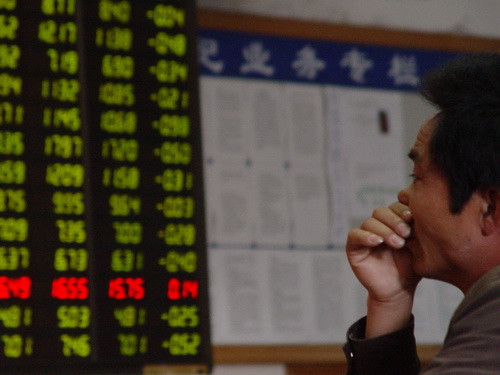Markets
Rosy earnings in Q1 fail to halt market downturn
By Zhou Yan (China Daily)
Updated: 2010-05-05 10:19
 |
Large Medium Small |
Inflationary concerns may weigh down profits of listed companies in Q2
BEIJING - Chinese listed firms posted solid earnings in the first quarter, propped up by rising sales and cost cutting measures, but the positive results failed to reverse the stock market's relentless plunge.
Overall quarterly profits made by 1,807 firms traded in China's Shanghai and Shenzhen bourses rose 61.2 percent over a year earlier to reach 341.6 billion yuan, while earnings per share (EPS) was up 62.5 percent to 0.13 yuan in the first three months from a year ago, according to securities research and analysis firm TX Investment Consulting Co Ltd.
 |
|
Chinese stocks fell on Tuesday, sending the benchmark index to the lowest in seven months. Listed firms posted solid earnings in the first quarter, however that failed to reverse the stock market’s slide. [SHI YAN / FOR CHINA DAILY] |
Profits for the chemical fiber, non-ferrous metals and auto sectors took the lead, coming in 11 times, seven times, and four times higher than the previous year respectively, while large-cap-filled industries like banking and coal posted lower than 40 percent year-over-year growth, indicating that impact from the country's massive fiscal and monetary policies on various sectors differed.
As for profit volume, Industrial and Commercial Bank of China, the country's largest lender, outperformed all other publicly traded firms to reap a profit of 41.5 billion yuan in the first three months of this year, followed by China Construction Bank and the largest domestic oil refiner China National Petroleum Corporation with 35.2 billion and 32.4 billion in profit respectively.
The solid growth was within market expectations and in light of the lower comparable base figure of 2009's first three months when most firms were hit hard by the financial crisis.
"The increase was expected. Companies gained momentum for growth when their costs were dramatically cut and demand was pushed up by the government's stimulus package," said Liu Jiwei, an analyst at Pacific Securities based in Beijing.
A recent research report from TX Investment Consulting showed that a decline in operating costs, impairment loss to assets, and management fees were among the major drivers of the advance in corporate earnings.
The strong earnings reports, however, didn't fuel the sagging stock market, which plunged 1.23 percent to end at 2,835.28 points on Tuesday, the lowest in almost seven months, on deepening worries that the top authorities' latest hike of the reserve requirement ratio and the clampdown on the property sector would curb liquidity.
The benchmark Shanghai Composite Index accumulatively sank by 7.67 percent in April, while the smaller Shenzhen Component Index dropped 10.66 percent.
The two bourses saw a total of 212.1 billion yuan of capital out flowing from the market last month.
| ||||
He added that the rising Purchasing Managers Index (PMI), a leading economic indicator measuring manufacturing sector performance, showed increasing inflation concerns that may weigh down the profits of companies in middle stream industries including steel and mechanical manufacturing.
China's April PMI was up 0.6 percentage points to stand at 55.7 percent.
The index has been above 50 percent for the 14 consecutive months.
"In the second and third quarters, it is highly unlikely we will see corporate profits as strong as in the first quarter, because we expect further measures to curb the realty sector," Mao said.













